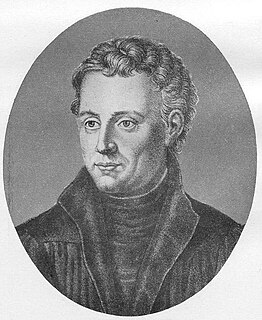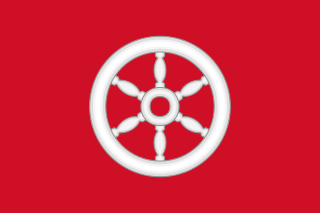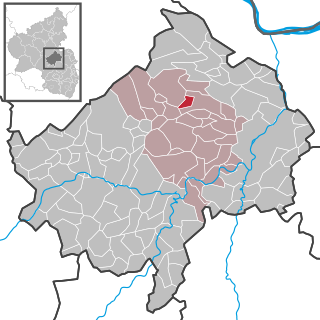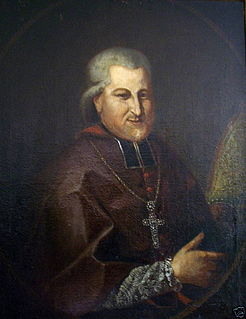
| Wikimedia Commons has media related to Johann von Dalberg . |
Johann von Dalberg (1445–1503) was the Prince-Bishop of Worms from 1482 to 1503.

| Wikimedia Commons has media related to Johann von Dalberg . |
Johann von Dalberg (1445–1503) was the Prince-Bishop of Worms from 1482 to 1503.
Johann von Dalberg was born in 1445, the son of Wolfgang von Dalberg. He studied at Erfurt and in Italy, where he took his degree of doctor utriusque juris at the University of Ferrara and devoted himself more especially to the study of Greek.

Dalberg is the name of an ancient and distinguished German noble family, derived from the hamlet and castle of Dalberg or Dalburg, near Kreuznach in Rhineland-Palatinate.

The University of Erfurt is a public university located in Erfurt, the capital city of the German state of Thuringia. It was founded in 1379, and closed in 1816. It was re-established in 1994, three years after German reunification. Therefore it claims to be both the oldest and youngest university in Germany. The institution identifies itself as a reform university, due to its most famous alumnus Martin Luther, the instigator of the Reformation, who studied there from 1501 to 1505. Today, the main foci centre on multidisciplinarity, internationality, and mentoring.

Italy, officially the Italian Republic, is a country in Southern Europe. Located in the middle of the Mediterranean Sea, Italy shares open land borders with France, Switzerland, Austria, Slovenia and the enclaved microstates San Marino and Vatican City. Italy covers an area of 301,340 km2 (116,350 sq mi) and has a largely temperate seasonal and Mediterranean climate. With around 61 million inhabitants, it is the fourth-most populous EU member state and the most populous country in Southern Europe.
Returning to Germany, he became privy councillor to Philip, Elector Palatine, whom he assisted in bringing the University of Heidelberg to the height of its fame. He was instrumental in founding the first chair of Greek, which was filled by his friend Rudolphus Agricola, and he also established the university library and a college for students of civil law. He was an ardent humanist, was president of the Sodalitas Celtica founded by the poet Konrad Celtes, and corresponded with many of the leading scholars of his day, to whom he showed himself a veritable Maecenas. He was employed also on various diplomatic missions by the emperor and the elector.

Philip the Upright was an Elector Palatine of the Rhine from the house of Wittelsbach from 1476 to 1508.
Civil law, or civilian law, is a legal system originating in Europe, intellectualized within the framework of Roman law, the main feature of which is that its core principles are codified into a referable system which serves as the primary source of law. This can be contrasted with common law systems, the intellectual framework of which comes from judge-made decisional law, and gives precedential authority to prior court decisions, on the principle that it is unfair to treat similar facts differently on different occasions.
Humanism is a philosophical and ethical stance that emphasizes the value and agency of human beings, individually and collectively, and generally prefers critical thinking and evidence over acceptance of dogma or superstition. The meaning of the term humanism has fluctuated according to the successive intellectual movements which have identified with it. The term was coined by theologian Friedrich Niethammer at the beginning of the 19th century to refer to a system of education based on the study of classical literature. Generally, however, humanism refers to a perspective that affirms some notion of human freedom and progress. It views humans as solely responsible for the promotion and development of individuals and emphasizes a concern for man in relation to the world.
He became Prince-Bishop of Worms in 1482 and died on 28 July 1503. [1]
Dalberg's students include Conrad Celtis.

Johann Reuchlin, Count Palatine by Imperial and Papal Authority was a German-born Catholic humanist and a scholar of Greek and Hebrew, whose work also took him to modern-day Austria, Switzerland, and Italy and France. Most of Reuchlin's career centered on advancing German knowledge of Greek and Hebrew.

The Electorate of Mainz, previously known in English as Mentz and by its French name Mayence, was one of the most prestigious and influential states of the Holy Roman Empire. In the Roman Catholic hierarchy, the Archbishop-Elector of Mainz was the Primate of Germany, a purely honorary dignity that was unsuccessfully claimed from time to time by other archbishops. There were only two other ecclesiastical Prince-electors in the Empire: the Electorate of Cologne and the Electorate of Trier.

Johann Frederick I, called Johann the Magnanimous, was Elector of Saxony (1532-1547) and head of the Schmalkaldic League.

Karl Theodor Anton Maria von Dalberg was Prince-Archbishop of Regensburg, Arch-Chancellor of the Holy Roman Empire, Bishop of Constance and Worms, Prince-Primate of the Confederation of the Rhine and Grand Duke of Frankfurt.

The Schönborn family is a noble and mediatised formerly sovereign family of the former Holy Roman Empire.

Johann Philipp von Schönborn was the Archbishop-Elector of Mainz (1647–1673), the Bishop of Würzburg (1642–1673), and the Bishop of Worms (1663–1673).

The Electorate of Trier, traditionally known in English by its French name of Trèves, was an ecclesiastical principality of the Holy Roman Empire that existed from the end of the 9th to the early 19th century. It consisted of the temporal possessions of the prince-archbishop of Trier, also prince-elector of the empire. There were only two other ecclesiastical prince-electors in the Empire: the Electorate of Cologne and the Electorate of Mainz, among which Mainz ranked first.

The Elector of Mainz was one of the seven Prince-electors of the Holy Roman Empire. As both the Archbishop of Mainz and the ruling prince of the territory, the Elector of Mainz held a powerful position during the Middle Ages. The Archbishop-Elector was president of the electoral college, arch-chancellor of the empire and primate of Germany until the dissolution of the empire in 1806.

Johann Philipp von Walderdorff was the Archbishop-Elector of Trier from 1756 until 1768, and the Prince-Bishop of Worms from 1763 until 1768.

Franz Georg von Schönborn-Buchheim was the Archbishop-Elector of Trier from 1729 until 1756, and the Prince-Bishop of Worms and Prince-Provost of Ellwangen from 1732 until 1756.

The Prince-Bishopric of Osnabrück) (German: Hochstift Osnabrück; Fürtsbistum Osnabrück was a state of the Holy Roman Empire from 1225 until 1803. It should not be confused with the Diocese of Osnabrück, which was larger and over which the prince-bishop exercised only the spiritual authority of an ordinary bishop. It was named after its capital, Osnabrück.

Dalberg is an Ortsgemeinde – a municipality belonging to a Verbandsgemeinde, a kind of collective municipality – in the Bad Kreuznach district in Rhineland-Palatinate, Germany. It belongs to the Verbandsgemeinde of Rüdesheim, whose seat is in the municipality of Rüdesheim an der Nahe.

Prince-Provost is a rare title for a monastic superior with the ecclesiastical style of provost who is a Prince of the Church in the sense that he also ranks as a secular 'prince', notably a Prince of the Holy Roman Empire (Reichsfürst), holding a direct vote in the Imperial Diet assembly coequal to an actual Prince-abbot, as in each case treated below.

Margaret of Bavaria was a princess of Bavaria-Landshut and by marriage Princess of the Palatinate.
Dorothea of Brandenburg was a princess of Brandenburg by birth and by marriage Duchess of Saxe-Lauenburg.
John II of Baden was a titular Margrave of Baden and was Archbishop and Elector of Trier as John II of Baden from 1456 until his death in 1503.

The Liebenau monastery was a Dominican monastery. It was located outside the city gates of Worms in today's Worms-Hochheim district.

Johann von Eych was a German Roman Catholic bishop and cardinal.
| Catholic Church titles | ||
|---|---|---|
| Preceded by Reinhard von Sackingen | Prince-Bishop of Worms 1482–1503 | Succeeded by Reinhard von Rüppurr |
| This article about a German Catholic bishop or archbishop is a stub. You can help Wikipedia by expanding it. |